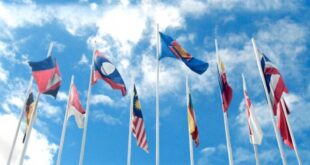By Maria Dubovikova
The confrontation between Russia and the West that started over the Ukrainian crisis, having led to mutual sanctions and blacklists, seems to be calming down. Both sides have shown readiness for dialogue and we seemed on the edge of a thaw in relations. However, it seems relations will once again freeze over.
The history of the blacklists game is a year and half long and is mostly about Russia-EU relations. The EU was the first to impose sanctions against particular political, bureaucratic and business figures, putting them on a blacklist and banning them from entering EU countries and doing business.
The global situation is too far from the ideal one to let the countries continue dubious and dangerous games with no clear goal
Maria Dubovikova
These steps were taken along with sanctions against Russia’s economic interests in Europe. Russia answered with symmetrical measures, imposing a food embargo and placing EU political figures on a travel ban list as well. The difference was only that Russia didn’t reveal these names and political figures traveling to Russia – they discovered that they were banned only while attempting to cross the Russian national border. Sanctions and blacklist games were the wrong move but this didn’t prevent both sides from taking these steps.
Spate of dissatisfaction
The recent spate of dissatisfaction, mostly displayed in the media for now, came after the EU asked Russia to confidentially share the list of people banned from traveling to Russia in order to prevent unpleasant incidents on the border for the persons in question. But the list, despite the guarantees given, has been leaked and certain political circles used it in a clear attempt to aggravate the bilateral climate and prevent its improvement.
Apparently this demand came as a result of the recent case with Karl-Georg Wellmann, German MP, politician and the head of the German-Ukrainian parliamentary group, who came to Russia following the invitation of the Head of the Foreign Affairs Committee of Russia’s Council of Federation, Konstantin Kosachev, and found out at border control at the airport that he is banned from traveling to Russia until 2019. Berlin reacted immediately, harshly criticizing Moscow for putting Wellmann in the black list saying that “Russia’s refusal to allow Wellmann’s entry is incomprehensible and unacceptable” and expected the ban to be lifted soon.
Now this reaction is coming from different sides of the EU’s political establishment that angrily demand explanation to the list, as if it has just appeared, as if the EU didn’t have its own blacklist. The EU countries accuse Russia of taking a hostile step that won’t contribute to the settlement of the crisis and thus convince the players of the importance of keeping a hard line in relations with Russia as well as the policy of pressure and confrontation. This is insane.
Flawed logic on both sides
According to a leaked document, Russia has banned the most hawkish political figures, who permitted themselves to criticize Russia in a most hostile way during the toughest period of the Ukrainian crisis from traveling. Polish politicians form the majority of the figures on the list of 89 names. And this is no surprise taking into account the position taken by Poland and its politicians during the crisis’s escalation.
According to Russia’s logic, the list has several functions: a reciprocal measure against the EU’s unfriendly steps and a punitive instrument – something of a cold shower for those who were hot-headed during the crisis.
This logic of Russia’s blacklist is as naive and irrelevant as the EU logic of imposing sanctions to make Russia change its course and position. Both ban lists and mutual sanctions should be lifted as soon as possible, especially when all the sides still find it possible to talk about legitimacy and logic of measures taken in the current situation.
The global situation is too far from the ideal one to let the countries continue dubious and dangerous games with no clear goal. The Ukrainian crisis needs cooperation between the EU and Russia to be settled, not a confrontation, even if the EU hawks don’t want this. But despite the current noise in the media and declarations from different sides of the political establishment, there is a high probability that this attempt to fire up the confrontation will fail as reason and adequate thinking should prevail. The world needs unity and broad cooperation facing the unprecedented threats that by all accounts may soon place us on the brink of survival.
Maria Dubovikova is a President of IMESClub and CEO of MEPFoundation. Alumni of MGIMO (Moscow State Institute of International Relations [University] of Ministry of Foreign Affairs of Russia), now she is a PhD Candidate there. Her research fields are in Russian foreign policy in the Middle East, Euro-Arab dialogue, policy in France and the U.S. towards the Mediterranean, France-Russia bilateral relations, humanitarian cooperation and open diplomacy.
 Geostrategic Media Political Commentary, Analysis, Security, Defense
Geostrategic Media Political Commentary, Analysis, Security, Defense





